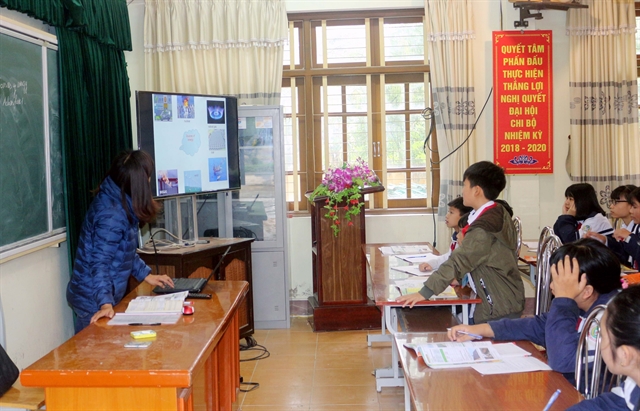 Society
Society


|
| Teacher and students in an English class at Thanh Hương Junior Secondary School in Thanh Liêm District, the northern province of Hà Nam. — VNA/VNS Photo Đại Nghĩa |
HÀ NỘI — Prime Minister Nguyễn Xuân Phúc has approved a nationwide foreign language programme for State workers from 2019-30.
The programme aims to improve foreign language skills at work and on the international scene.
The programme will apply for State organisations, and social and political organisations from central to communal levels.
It targets that by 2025, half of State workers at central level and 25 per cent at provincial and district levels, especially those in managerial positions and under 40 years old, to have proficient foreign language skills.
Also by 2025, 20 per cent of State workers at communal level, especially under-40-year-old managers, will have foreign languages certificates.
The programme targets that by 2030, the figures will rise to 60, 35 and 25 per cent, respectively.
To implement the programme, one of the most important measures is to improve education and raise people’s awareness of the importance of foreign languages while working and adapting to the international environment.
The programme will offer policies to support State workers while they study foreign languages.
Tests will be held regularly to monitor the standard of teaching and learning.
Nguyễn Tiến Dĩnh, deputy minister of Home Affairs, told Thanh Niên (Young People) newspaper that foreign languages and IT qualification were very important for State workers in the international integration process and the Fourth Industrial Revolution.
In the future, the education sector planned to start teaching foreign languages officially at preschool level, so kindergarten teachers must have foreign language qualification, he said.
However, State workers have doubts about the programme.
Nguyễn Minh Hương, a teacher at a primary school in Hà Nội, said that she and her colleagues would have to spend a lot of time, even at weekends, studying foreign languages.
“Even if we pass we will gradually forget that knowledge. All that time and effort would be for nothing,” said Hương.
“What about teachers in remote provinces? They have less chance to use foreign languages than us,” she said.
They would also have to travel far to attend the classes, and that would hit their health and work.
Nguyễn Thanh Lâm, a worker at Bắc Giang People’s Committee, said the programme should classify the training based on region.
“The focus should be put on provinces and cities with high potential for international integration, such as Hà Nội, Đà Nẵng, Cần Thơ, HCM City and Nha Trang,” he said.
Poor remote provinces and cities should have a longer time to implement the policy, otherwise it would be impossible. — VNS




